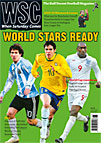 After months of chaos Darlington have been relegated to the Conference. But Thom Kennedy has spotted signs of recovery
After months of chaos Darlington have been relegated to the Conference. But Thom Kennedy has spotted signs of recovery
The end-of-season dead rubber is often tagged with the optimistic phrase “playing for pride”, though we’ve all seen enough insipid bore-draws played out in front of sparse crowds trying to get value from their season tickets to know there’s little pride involved. But, for an example of a last-gasp attempt to restore some semblance of dignity, Darlington’s victory at Macclesfield on the season’s penultimate weekend fits perfectly. The 2-0 win spared the 54 players who have trudged into the Darlington Arena – and in most cases back out again – during this season the shame of being part of the worst-ever Quakers team.
The last 16 months have been disastrous for Darlington. When soaring towards the top of League Two in February 2009, before crippling administration loomed into view, scraping past the club’s record low points tally of 29 with one game of the season left would not have looked like an achievement.
After exiting administration a day before the new season began, with only two first-team players left, nobody expected glory. But nobody foresaw the extent of the struggle ahead. It took five games for Darlington to acquire their first point, a further four for the second, before the first win arrived on October 17, 13 games into the campaign.
By that time, Colin Todd, whose hastily assembled squad struggled desperately for goals, had given way to Steve Staunton, but despite a rash of signings – some good, some bad – the upturn in fortunes under the former Republic of Ireland boss was brief and bumpy. A dire home defeat to Barnet saw Staunton replaced with ex-Barnsley manager Simon Davey, who finally brought an upturn in performances, results and optimism towards the end of the season.
Davey began recruiting for next year’s Conference campaign quickly, bringing in former Quakers keeper Sam Russell, Sunderland midfielder Jamie Chandler and German full-back Dominik Werling, who served under Davey at Barnsley. Like Russell, former loanee Chandler was popular with supporters and both are decent signings. But perhaps more welcome, after an unbalanced squad was recruited in a few desperate days last year, is the level of preparation for next season the early recruitment affords Darlington. Davey’s presence is another boon and could help season-ticket sales in the summer. Staunton never endeared himself to fans, sidelining club captain Steve Foster and screaming at players from the technical area. Davey’s more measured persona and popular signings look better placed to galvanise support.
The Macclesfield victory, featuring fine performances from several youngsters from Darlington’s increasingly fruitful youth system, washed away an unwanted record and represented a flicker of light for a club that’s too accustomed to gloom. It was the Quakers’ fourth triumph in six away matches and suggested Davey could curtail the recent plunge from grace.
Chairman Raj Singh appears keen to make friends among local businesses with several interesting initiatives and supporters are enjoying reduced season-ticket prices and a series of meet-the-players events. The dire season we have had may mask any optimism but in relative terms the future looks more secure than it has for years.
That said, whatever the future holds, it will happen at the huge Darlington Arena. In a recent newspaper article Singh batted away questions on downsizing with an ambiguous “never say never”, but there’s currently no feasible alternative. Nobody really knows the price of the Arena, but its corporate facilities ought to compensate for any extra running costs, including the £10,000-per-year rent due to ex-chairman George Houghton from next season.
Despite crowds falling as low as 1,500 this season, the 27,000-seat stadium remains the club’s only home, particularly since planning permission for housing at the club’s old Feethams ground finally ended hopes for a return to our charismatic but ramshackle former home among nostalgic types in the Quakers’ support. The season ended with the Arena’s West Stand, home to the team’s most vocal element, closed for “ongoing safety work”, leaving all home fans together in the main stand alongside the pitch. But you can still occasionally find a quiet row to yourself at evening fixtures.
Singh’s charm offensive has been geared towards drawing fans back after the dip in atmosphere following some horrible performances under Staunton. Meanwhile, he wants the club run within its means, in contrast to previous chairmen’s promises of a future in the Premier League. Supporters whose cheeks still sting with the embarrassment of our cut-price exits from administration welcome such sense.
Darlington has never been an easy place to run a football club, with struggles on the pitch and in the boardroom littering the club’s history. But with Singh and Davey’s combined expertise, and expectations tempered by the experience of administration, supporters are finally beginning to feel optimistic once again.
From WSC 280 June 2010